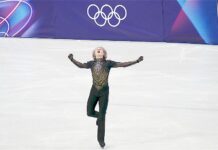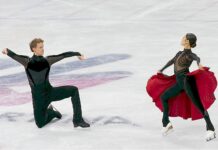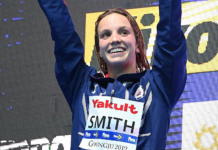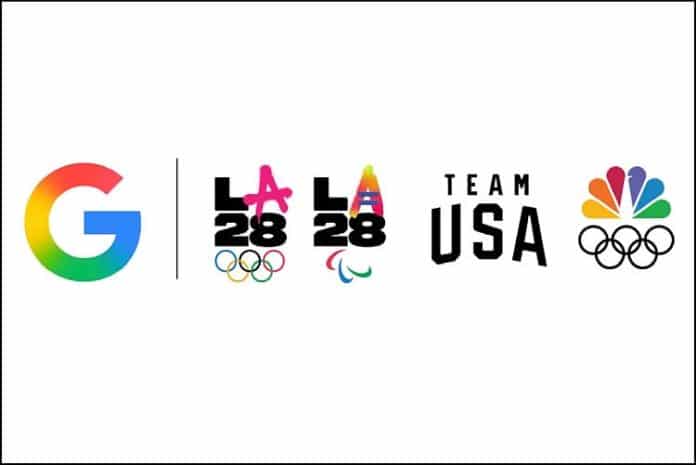★ The Sports Examiner: Chronicling the key competitive, economic and political forces shaping elite sport and the Olympic Movement.★
★ To get the daily Sports Examiner Recap by e-mail: sign up here! ★
≡ SEMENYA vs. WORLD ATHLETICS ≡
South Africa’s two-time Olympic women’s 800 m champion Caster Semenya told the German DW news agency that her fight in the courts against World Athletics sex regulations is not over. Referring to comments by her attorney to The Associated Press last week:
“It’s not about stopping, it’s never the end. They didn’t understand what my legal team was saying. It’s not the end, it’s just the beginning of making sure that we fight the right cause. World Athletics is constantly changing its policies. With the new policies, we are forever fighting. We want to make sure that athletes are protected.
“[Court appeals are] not necessarily over. I’m still yet to decide if we still go on with the courts. I’m still waiting for my legal team to finalize everything.”
Semenya, as she has done consistently, blasted World Athletics:
“Regulations like this are not safe for the sport. It questions the quality of the leaders that we have now. That’s weak leadership because you can’t impose rules that you know are not in favor of some of the nationalities, where in their countries, those are illegal.
“If you’re going to regulate, you have to regulate fairly for everyone. That’s what we need to promote, rather than promoting mediocre. It’s got nothing to do with regulation, it’s about people imposing power over other people.”
After a partial win at the European Court of Human Rights, which called a more “rigorous” review of her case, her next step is a return to the Swiss Federal Tribunal.
¶
Observed: Semenya has now positioned herself as a permanent activist, because her next appeal to the Swiss Federal Tribunal is not likely to win:
● The Court of Arbitration’s key holding in April 2019 was that she was – in fact – discriminated against by the then-in-place testing rules, but that such discrimination was justified by the greater good of fair play in the women’s category:
“[T]he majority of the Panel accepts that the IAAF has discharged its burden of establishing that regulations governing the ability of female athletes with 46 XY DSD to participate in certain events are necessary to maintain fair competition in female athletics by ensuring that female athletes who do not enjoy the significant performance advantage caused by exposure to levels of circulating testosterone in the adult male range do not have to compete against female athletes who do enjoy that performance advantage.”
● The European Court of Human Rights decision in Semenya’s favor acknowledged that the issues she raised were very carefully considered already:
“The Court’s task is therefore to verify whether the examination of the case by the Federal Supreme Court, within its competence to review the compatibility of the award with substantive public policy, fulfilled the requirement of particular rigour called for by the circumstances of the case and given the nature of the mandatory and exclusive sports arbitration which had led to the award. It will precede its assessment with details of the CAS’s examination and award, which the Swiss Federal Supreme Court was required to review.
“The Court would begin by pointing to the length of the CAS award (163 pages, of which 46 concerned the examination on the merits), and of the Federal Supreme Court’s judgment (70 pages, of which 38 were dedicated to legal reasoning). This appears to demonstrate the attention that both the CAS and the Federal Supreme Court accorded to the examination of the applicant’s
dispute.
“The Court also notes that the CAS took into account statements from around 30 medical, scientific and legal experts called by the parties, including around 15 by the applicant.”
But the Court was unhappy with the “limited review” of the Swiss Federal Tribunal of one aspect of the case.
● On another review of the case, the Swiss Federal Tribunal has several options beyond simply a lengthier discussion, which could include calling Semenya’s case moot, since the regulations under which she filed in 2018 have been changed multiple times.
Or, it could acknowledge the continuing scientific exploration of the question of women with differences in sex development (DSD) or transgender women participating in the women’s category and throw out the entire case and ask Semenya to start all over again, based on the current World Athletics requirements for a yes-or-no cheek swap or blood test for the SRY gene.
Or, if Semenya’s logic to “regulate fairly for everyone,” then the entire question of whether a separate category for women is even called for. Equestrian is a mixed-gender sport and certainly shooting or archery could be questioned as to whether there is a need for separate gender competitions.
Semenya says she will continue to pursue her goals. World Athletics will continue to pursue its views as well. This could go on for a long time.
¶
★ Receive our exclusive, weekday TSX Recap by e-mail by clicking here.
★ Sign up a friend to receive the TSX Recap by clicking here.
★ Please consider a donation here to keep this site going.
For our updated, 850-event International Sports Calendar for 2025, 2026 and beyond, by date and by sport, click here!


























